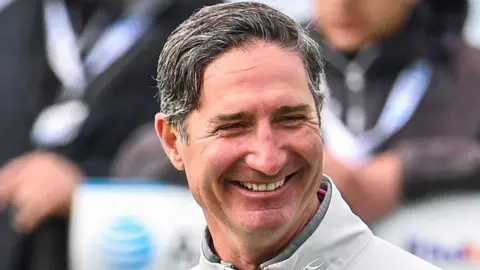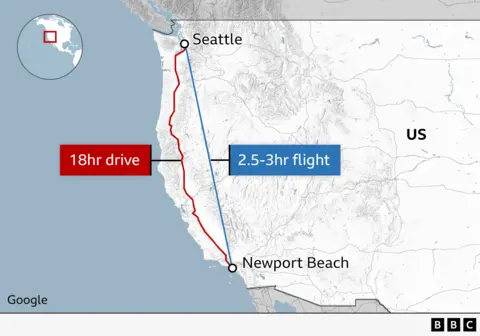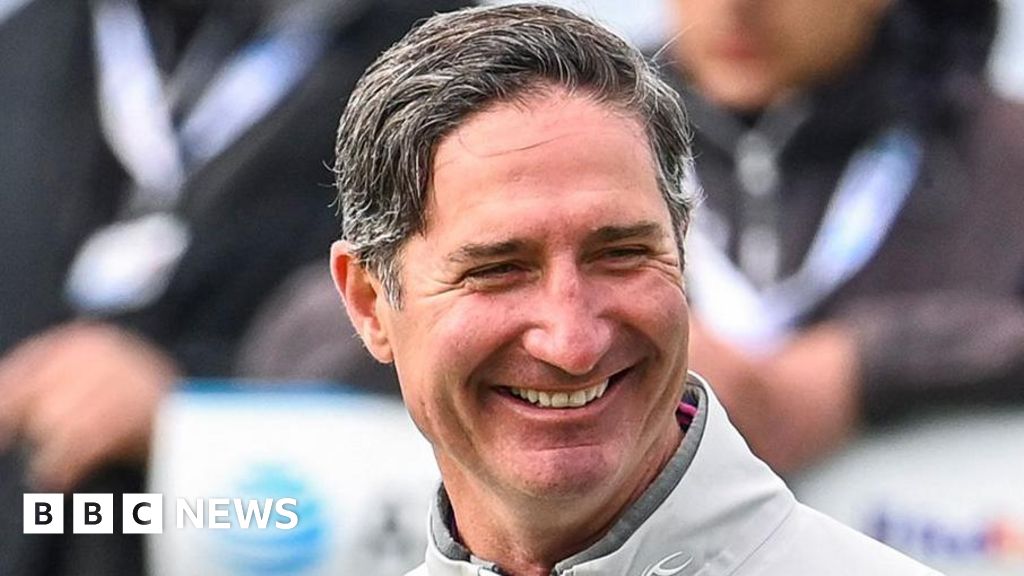 Getty Images
Getty ImagesThe newly-announced boss of Starbucks, Brian Niccol, has come under fire after it was revealed he will commute almost 1,000 miles (1,600km) from his family home in Newport Beach, California, to the firm’s headquarters in Seattle on a corporate jet.
Critics have noted what they see as a discrepancy between the company’s public stance on green issues and the lifestyles of its top executives.
Mr Niccol is due to take up the role at the helm of the world’s biggest coffee shop chain on 9 September.
A Starbucks spokesperson told the BBC Mr Niccol will have a primary office in Seattle where he will spend most of his time when he is not “visiting partners and customers” around the world.
Mr Niccol’s job offer did say he would “not be required to relocate to the company’s headquarters”, but added: “You agree to commute from your residence to the company’s headquarters… as is required to perform your duties and responsibilities”.
The document states that he will be eligible to use the company’s aircraft for “business related travel” and for “travel between [his] city of residence and the company’s headquarters”.
Starbucks also said it will set up a small remote office in Newport Beach for Mr Niccol to use when working from California.
Starbucks has a hybrid work policy that means employees have to be in the office at least three days a week.
“Brian’s schedule will exceed the hybrid work guidelines and workplace expectations we have for all partners,” a Starbucks spokesperson said.
The coffee shop chain added that Mr Niccol is likely to buy a home in Seattle.

Dan Coatsworth, an investment analyst at AJ Bell, told the BBC Mr Niccol “on paper” was being given the “same hybrid working terms as other office-based employees, as one might expect”.
“However, what leaves a sour taste is the idea he can use a private jet to nip 1,000 miles between California and Seattle,” he added.
Mr Coatsworth said while using a private jet was not only bad for the environment and would send a bad message to customers and staff, it was also “ultimately not a practical way to run a $105bn business with an estimated 400,000 employees”.
“A leader needs to be at the heart of a business, not sitting on the beach enjoying the perks of the job,” he said.
“The fact Brian Niccol was drafted in to give a new lease of life to Starbucks implies he has a big challenge ahead. This isn’t taking the reins of a business firing on all cylinders; it’s a repair job which means being in the engine room at all times.”
The topic of where people work from has been debated in recent years, with companies in many industries wrestling with whether to allow the remote work practices that exploded during the coronavirus pandemic to continue.
Andrew Speke, a spokesperson for High Pay Centre, a think tank which tracks executives’ pay, said it was important for business leaders that “employees can see that it’s not one rule for them and one rule for their bosses”.
‘One rule for them, one rule for us’
The terms of his employment also sparked a backlash on social media.
“That’s nice… good convenience for top talent! But hope we don’t see too many new ‘sustainability’ and ‘environment’ related ads from @starbucks? *Wink*,” said one X user.
“The new Starbucks CEO is ‘supercommuting’ 1,000 miles to Seattle on a private jet to work, so don’t be too harsh on that waitress who gave you a plastic straw when you didn’t want one,” said another.
Some sectors, such as banking, signalled early on that they would expect staff to return to the office full-time, while others, often in the tech industry, have said they will allow remote work indefinitely. Many places have opted for a mix.
Others focused on how much Mr Niccol is set to get paid in his new job.
“How come we never talk about CEO pay when we talk about rising prices?” former US Secretary of Labor Robert Reich posted.
According to the terms of his offer, Mr Niccol’s annual base pay will be $1.6m (£1.2m). On top of that he could get a performance-related bonus of as much as $7.2m and up to $23m a year of Starbucks shares.
A report published by the United Nations in 2021 showed that the world’s wealthiest 1% of people produced double the combined carbon emissions of the poorest 50%.
Starbucks announced this month that Mr Niccol would be replacing Laxman Narasimhan as its chief executive.
The announcement came as the coffee chain looks to boost flagging sales.
Mr Niccol had led the Mexican fast food chain Chipotle since 2018, helping it to recover from a crisis after outbreaks of food poisoning.
During his time in the role the firm’s sales doubled and its shares surged from less than $7 each to more than $50.
Chipotle also opened almost 1,000 new stores and new technologies were introduced to automate food preparation.
In recent months, it has been seen as a bright spot in the restaurant industry, where many businesses have reported that customers are cutting spending.


